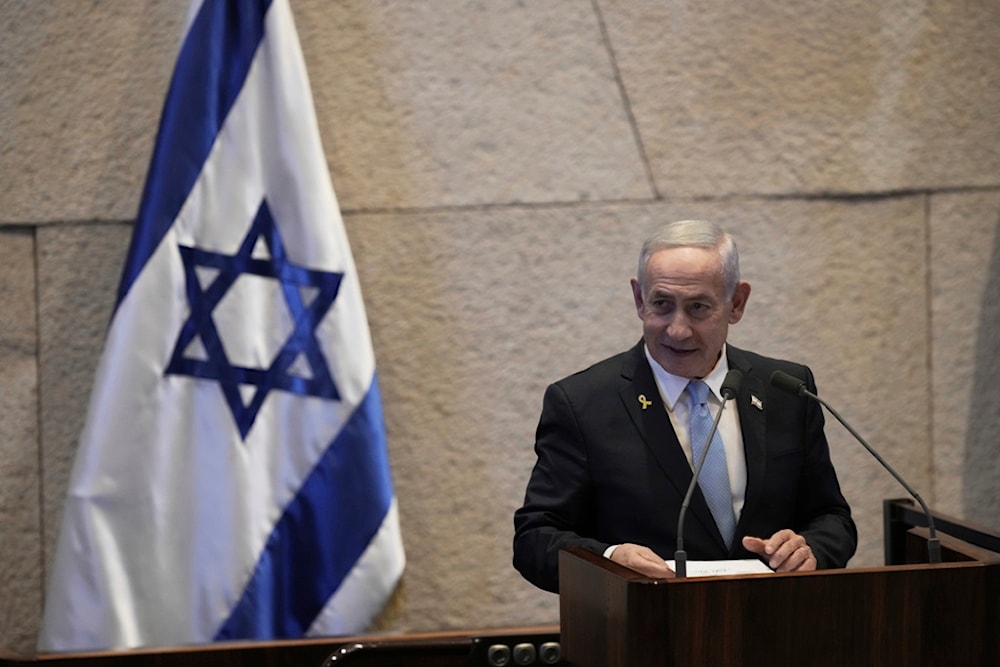Trump's call to end Netanyahu trial fuels Israeli debate over pardon
Netanyahu's supporters insist it's "unreasonable" to expect him to defend himself in court while managing existential threats to the occupation.
-

Israel's Prime Minister Benjamin Netanyahu delivers a welcome message during a visit by Argentina's President Javier Milei, in the Knesset, "Israel's" parliament, in occupied al-Quds, on June 11, 2025. (AP Photo/Ohad Zwigenberg)
US President Donald Trump's recent call to end Israeli Prime Minister Benjamin Netanyahu's corruption trial has reignited a fierce debate in "Israel" over the future of the proceedings, now stretching into their sixth year. Though initially seen by some as an external intrusion, Trump's comments have bolstered growing calls from across "Israel's" political spectrum to bring the trial to a close, Bloomberg reports on Thursday.
At the heart of the discussion is Israeli President Isaac Herzog, who holds the authority to issue a presidential pardon. He is reportedly in talks with former Chief Justice Aharon Barak, a respected figure in the legal community. Barak told Makor Rishon, "I don't care if it's by that method or a plea bargain, the main thing is that we reach an agreement." His position reflects a broader frustration with a legal process that, even among critics of Netanyahu, is seen as having become a long-running political liability.
Trial shield
Netanyahu is facing charges in three separate corruption cases, collectively known as Cases 1000, 2000, and 4000. These include allegations of receiving luxury gifts from billionaires, attempting to secure favorable media coverage in exchange for political favors, and manipulating regulatory decisions to benefit business allies. The charges, bribery, fraud, and breach of trust, have been denied outright by Netanyahu, who claims they are part of a politically motivated campaign against him. Trump echoed this line in his recent Truth Social post, describing the case as a "witch hunt" akin to his own legal battles.
The trial, which formally began in 2020, has been repeatedly delayed, with Netanyahu frequently requesting postponements due to state obligations. Critics argue he is deliberately using the ongoing war on Gaza and the wider region to shield himself from legal consequences. Since October 2023, "Israel" has launched military assaults in Gaza, Lebanon, Syria, and even Iran, developments that have allowed Netanyahu to claim that court appearances are incompatible with wartime leadership.
Moreover, Netanyahu's supporters insist it's unreasonable to expect him to defend himself in court while managing "existential threats" to the occupation. Similarly, Trump claimed that Netanyahu's trial is obstructing ceasefire negotiations with Hamas, noting that "Israel" has now reportedly agreed to a 60-day pause in hostilities while around 20 living captives remain in Hamas custody.
Despite the pressure, Israeli prosecutors have held their ground, continuing to cross-examine Netanyahu while remaining open to a plea deal, according to Bloomberg. Furthermore, the report added that legal experts warned that a presidential pardon would be a dramatic and controversial step.
Exit option
As discussions continue about the possibility of resignation or a negotiated exit, some close to Netanyahu suggest he may be more open to stepping aside than ever before. "He's been through a lot," said TV host Yinon Magal. "This is a perfect opportunity to say, 'I've done my part,' and walk away."
Still, Netanyahu has shown little willingness to relinquish power voluntarily. In 2022, he rejected a proposed deal that would have kept him out of prison in exchange for a temporary political hiatus. Writing in Haaretz, Barak insisted that, should the charges be dropped, Netanyahu must still step down.
Read more: 'Israel' establishes first civilian court in West Bank settlement

 3 Min Read
3 Min Read









